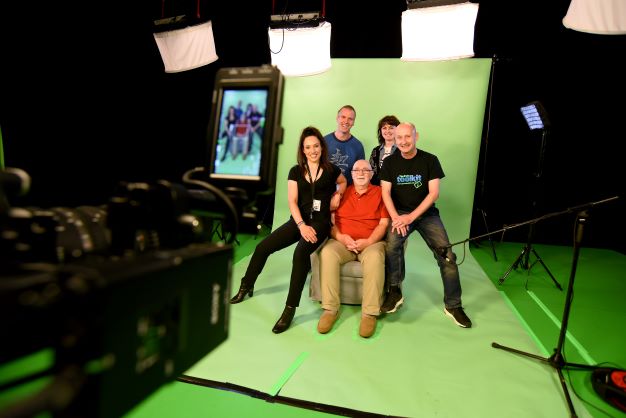Technology could offer new support for people living with persistent pain
News

A new Artificial Intelligence (AI) project underway at Teesside University could help millions of people to manage their persistent pain.
The technology will offer around-the-clock access to support from an international expert in pain management, helping patients to manage their symptoms and improve their quality of life.
The work has involved creating an AI version of international pain management expert, Pete Moore. The AI version of Pete will be available online to have conversations, answer questions and help people with their pain symptoms, whenever they need it.
The project is a collaboration between academics from Teesside University, Pete Moore and StoryFile – a US-based provider of AI technology. It involves Pete undergoing an intense interview process to record hundreds of questions and answers, which will then be used to create a virtual version of himself – dubbed ‘AI Pete’.
Patients can use the AI technology alongside the ‘Pain Toolkit’, a leading global resource used by people with persistent pain conditions as well as healthcare professionals, which was also developed by Pete Moore.
It can also be used as a teaching resource for health care students, helping them to understand more about working with patients who experience ongoing pain.
The project is being supported by the National Institute for Health and Care Research (NIHR) Applied Research Collaboration (ARC) North East and North Cumbria (NENC).
Denis Martin, Professor of Rehabilitation and Director of the Centre for Rehabilitation at Teesside University, who is leading the work, said: “One of our main priorities within the centre is to help people with persistent pain. As part of this, we have been focusing on the real-world applications of using cutting-edge technology within healthcare and what this means for both the patient and the medical professional.
“The AI agent will support pain management and provide a unique educational resource for our healthcare students. Talking to AI Pete will allow them to understand more about the experiences of those living with persistent pain and develop key skills and understanding in how to work with the patient and the condition.”
Pete Moore, who is 68, lives with persistent pain, asthma and osteoarthritis himself. He was named Pain Champion UK in 2014 in recognition of his contributions to pain management and has gone on to create a number of other useful resources including online workshops and a virtual café.
He said: “Teesside University is leading the way in the use of this cutting-edge technology to make a real difference within healthcare. Through this project, we’re hopefully making a big difference to people living with pain because it opens a dialogue and allows people to talk through their persistent pain with the AI version of me whenever they need to.”
Dr Sophie Suri is an NIHR Applied Research Collaboration (ARC) North East and North Cumbria (NENC) Research Associate at Teesside University, and part of the project team.
She said: “We are thrilled to use this new and interesting approach to extend the reach of the Pain Toolkit. This project enables us to make a real difference to people living with persistent pain, boosting self-management and understanding, and that is very rewarding work. These new technologies are exciting to work with, but our ultimate aim is to help real people. It is all about the patient in healthcare, and this development has the potential to help millions.”
The innovative project is part of the Interreg North-West Europe VR4Rehab project and forms part of Teesside University’s wider work around pain management.
It is supported and part-funded by the National Institute for Health and Care Research (NIHR) Applied Research Collaboration (ARC) North East and North Cumbria and will be completed by the end of 2022.
Professor Denis Martin leads the NIHR ARC North East and North Cumbria’s ‘Integrating Physical Health, Mental Health and Social Care’ research theme, and the project is an important part of the NIHR ARC NENC’s ongoing research around the management of persistent pain.
Dr Sophie Suri’s work is funded by the NIHR Applied Research Collaboration (ARC) North East and North Cumbria (NENC).
Find out more about the Pain Toolkit
Find out more about StoryFile